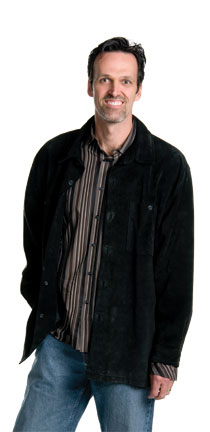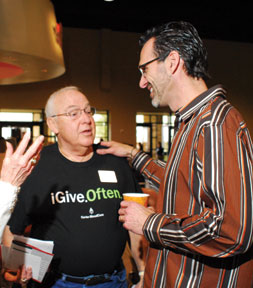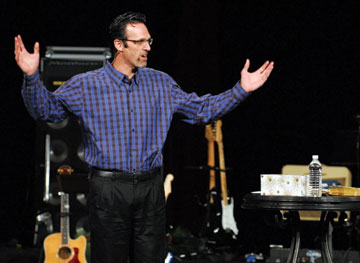
 Pete Briscoe, Bent Tree Bible Fellowship, Carrollton, TX
Pete Briscoe, Bent Tree Bible Fellowship, Carrollton, TX
By Ronald E. Keener
Born in England, Pete Briscoe saw ministry for his first eight years with his parents, Stuart and Jill Briscoe, as they worked with the Torchbearers group in northern England. Torchbearers, founded by Major Ian Thomas, “is all about teaching people that life is found in Christ and not in themselves,” Briscoe says.
Thomas would pick up orphan kids in Germany following the Second World War, brought them to England and raised and ministered to them. Stu Briscoe traveled a lot for the organization and Jill Briscoe was “deeply involved with street ministry to young hoodlums of Liverpool and Manchester,” her son recalls.
When his dad took the pastorate of Elmbrook Church near Milwaukee, the elder Briscoe laughed that not only had he never been a pastor before, he’d never been a member of an actual church either, having been raised in the Plymouth Brethren movement that didn’t have membership as such.
You sort of grew up as the Elmbrook congregation grew?
The church is an interesting story because it’s in Milwaukee, which is largely Catholic and Lutheran and it was right after Vatican II. In the early 60s Vatican II allowed Catholics for the first time to read their Bibles, and so people all over Milwaukee would have questions and would go and ask their priest; a lot of their priests really didn’t know the answers and would tell them to go listen to that English guy who’s teaching the Bible. The church grew from 300 to 6,000 in about four or five years.
They would come and they would meet Christ and stay there. It was one of the front-edge megachurches in the early 1970s, kind of before the megachurch movement, before Willow Creek. Bill Hybels chatted with my dad in the early years and so there was a great connection there. It was a great place to grow up; I learned a lot.
I’m told that you are on a kind of crusade to end biblical illiteracy?
My concern is that evangelicals say that they believe in the inerrancy of Scripture but they don’t know Scripture. I think they authentically believe that Scripture is where God’s truth is found, but when you start asking any penetrating questions at all, they start to stumble and stammer. I think that’s on us as pastors; there’s been a movement in the past 30 years to move away from solid expositional preaching where you exposite the Word, exege the text, and communicate what God is saying.
I think the net result of that over years is that you end up with a body that doesn’t really know God’s word and so the book, Belief Matters, uses the clauses of the Apostle‘s Creed to teach biblical theology, but it is written in kind of a whimsical story type fashion. I think it will help people. But my style is to communicate in real language the deep truths of God. Hopefully the book does that.
So what is your “elevator speech”? About being a Christian? How do you speak to unbelief today?
I’m convinced that many unbelievers are extremely authentic and real and are searching and desperate, especially with the economic crisis. I mean the rawness of people’s reality is stunning, I think, so my elevator speech is, “Let me guess. You are either trying really hard to impress God, or you’ve given up, or you don’t believe there is a God. My question to you is how are those three options working for you? Which one have you chosen and how is it working for you?
“Because what the Bible teaches clearly is that God is crazy about you; it’s call grace. And there’s nothing you can do to make him love you more and there’s nothing you can do to make him love you less.
“He loves you perfectly right now, he’s offered you life abundant, he’s paid for it, he’s done everything necessary for you to experience it and all he’s waiting for you to do is to say yes. If you’d like to learn more about that, the elevator is finishing on the top floor and we’re going to need to sit down and have a little longer chat.”
That’s what I would say to people because I’m convinced people are looking for life, life as found in Christ. If they could just realize that’s where life is found, then everything can change.
Have you ever debated an atheist?
I’m not a big debater. I think you can win an argument and lose a person and so my heart is to love people and to encourage conversation. I think a lot of argumentation is kind of like having a conversation with someone and they’re talking and we’re just waiting for them to get done so we can say what we want to say. That’s not real conversation and I think a lot of apologetics is kind of like that.
What I tend to do with folks is to say, “I would love to hear about your spiritual journey and I’d love to hear what you think and what you believe.” I just let them talk and ask as many clarifying questions as I can, because what I’ve discovered is that most people really haven’t thought out what they believe.
So as you start asking clarifying questions, they many times will back themselves into a corner. Then I just like my favorite question, “So how is that working for you?” And a lot of times they will say it’s not. Then we have an opportunity to start talking.
 You weren’t the founding pastor of Bent Tree?
You weren’t the founding pastor of Bent Tree?
The church was planted out of Gene Getz’ church, Fellowship Bible Church. Gene was on the cutting edge of the anti-establishment church in the 1970s and the 1980s. He was a professor at seminary and he was talking about what church really should be like. One of his students one day challenged him and said well it is easy for you as a professor to criticize other churches, why don’t you try it some time? He said okay, let’s go for it. Let’s us start a church, but we’ll do it right.
He started Fellowship Church and he sat on a stool and he used an overhead projector, which no one did then, and they sang choruses with a guitar and drums, which no one did, and they had share time, and it was just a completely new way of doing church.
The vast majority of churches look like that today but this was new in those days. His theory was you grow to 400 and then you plant. So that original church planted a number of churches. We were their third plant, I believe, in a little community called Bent Tree in a local school. Twenty-five people in a small group just became a church. And off they went from there.
It was about 15 years old when I arrived, they had a three-acre plot of land and a church building there, and they were just poised [for growth]. The elders told me we’re lacking two things — preaching and leadership. Not because they didn’t have leadership, they were all very strong leaders, but they needed kind of a point leader for them to lead together.
I said I can’t do much but I think those are the two things that God has asked me to do and encourages me to do, so we came and we got to see some really cool things happen over the years. It was about 250 people at that point and today we would have 4,000 or 4,500 people here on a Sunday — adults, kids, youth.
How do you measure effectiveness today?
Life change.
How do you know you have that?
Because you have people in enough intimate relationships where they are sharing life with people, where that kind of thing can authentically be measured. But that’s not an easy thing to measure.
Bodies, bucks, and buildings are the three things that are easy to measure, so that’s what we measure. I’m not convinced that those things really speak to spiritual health or vitality. But I think our mission is just to be used by God as he transforms people into disciples of Jesus Christ. We can’t transform people; that’s not our job. But He’s asked us to create an environment and to share His values and to allow Christ to live through us so that those types of things can happen and we can see true life transformation.
I think we are like every church in the land. We’ve got areas of great health and areas of great struggle and so when people say, “How’s your church doing?” my question is usually, “Well, what part of it?” Because there are slices that are doing great and there are slices that are really struggling and there are a lot of places that are on the journey one way or the other, because a body of believers is a dynamic thing — it’s moving parts, it’s extraordinarily complex.
How management oriented are you? When you talk about processes and systems, are you an MBA-type guy?
No, I’m not. I’m an artist-preacher.
What does that mean?
Hybels talks about 10 different kinds of leaders and using his terminology from his book, Courageous Leadership, I am a visionary-motivational-entrepreneurial leader. So I am a visionary, I can see where we’re going; I’m motivational, I can get people really fired up about going there, and I am entrepreneurial, I can get it started.
Now the problem is I am somewhat a little bit of an idea factory, and so I’ll come with an idea, I will get everyone excited, we’ll get it started. Then I’ve got a new idea, I’ll get everyone excited, we’ll get started — and over the years that’s caused great pain and struggle and suffering for our body and so I am not management oriented at all.
Hybels talks about cause, community and corporation. I’m a cause guy all the way, and so we’ve struggled over the years trying to find the balance on that and we will continue to struggle to find the balance.
 Our heart is to do things as effectively as we can but to make sure we’re doing the right things.
Our heart is to do things as effectively as we can but to make sure we’re doing the right things.
This church sits across the street, down the road from Prestonwood, a church three times Bent Tree’s size. Why would you build a church across the street from Prestonwood? That’s the question.
It’s actually not the right question. The right question is why Prestonwood would build across the street from us, because we were here first.
And that being said, before Dr. [Jack] Graham and Prestonwood bought the land up there, he called me and took me out for lunch. He said, Pete, I know you’re there and we would never want to do anything to hinder your ministry. This is what we are thinking of doing, do you have any input for us? I felt that was incredibly gracious of him. I had a number of people at Bent Tree say, “Oh, aren’t you worried, aren’t you concerned?” and here’s what I told them:
I said you know what? Prestonwood’s sanctuary is 7,000 seats. They could fill that 10 times on a weekend and there would still be more than 600,000 lost people within a five-mile radius of our church.
I said we don’t have to worry about that. If one more percent of lost people showed up in church this Sunday there wouldn’t be enough room in churches in America.
So this is not a problem, let’s not worry about it. They are partners in the Gospel with us, they have a little different flavor but they love Jesus. They are pointing people to Christ just like we are. And because they have a different flavor some people will be more comfortable there than they will be here; because we have a different flavor, some people will be more comfortable here than there. And we’re totally cool with that.
Earlier today I spent three hours in the recording studio at Prestonwood making a DVD series for our small groups here. Prestonwood make their facility available to us for that. They are incredible partners with us in the Gospel and we think very highly of them.
You decided on a life in ministry during a missions trip to the Philippines in 1982 with Sports Ambassadors. Missions have a strong pull on you?
Our heart is the heart of Christ, which is to see disciples made as we go into all the world, teaching them everything that he said, baptizing in the name of the Father, the Son and the Holy Spirit, because he goes with us. So that’s truly our heart and it’s really a cool piece of who we are as a church; it’s in our DNA, and there are lots of different examples of that.
We have an unreached people group that we’re seeking to minister to and reach and we are seeing God do cool things there. We have 53 missionary families that we support; we have five partnerships around the world and 10 projects that we do as well that we are real involved in around the world.
The Lord laid on your hearts during our expansion campaign to tithe 10 percent of the expansion giving to the world church. Because one dollar here is worth 10 dollars there, we are able to build 12 projects around the world at the same time we are building our building here.
Our facility here was a $32 million project; $2.5 million went for the project. Our first project was in Thailand, a two-story training facility that the church uses; the cost was $168,000. We have permits that cost more than that here.
The power of the dollar is not quite what it was, but it is still far beyond most of the currencies in these places and the church can have a huge impact if it just catches this vision for taking care of our brothers and sisters and for being a blessing to those who don’t know God.
Ever have moments of doubt in grappling with the essentials of the Christian faith?
I grew up in a Christian home; I gave my life to Christ when I was four. I never had any major rebellions, but for me my crisis of faith came during dark moments when my wife and I were sideways or when I got mono during my freshman basketball season in college and had to sit out the rest of the year. Or those moments when you kind of looked at things and go, boy, I thought this was supposed to be better with Jesus and this isn’t any better.
There’s a lot that’s better with Jesus, but he doesn’t promise to make everything right. So there’ll be things in our lives that are still wrong because we live in a fallen world after we’ve given our life to Christ, and there will still be pain and brokenness and grief.
Any concept that that all goes away when we say yes to Jesus is a misunderstanding and can lead to a lot of heartache.
 Belief matters, says Pete Briscoe in the first chapter of his book, Belief Matters: Grappling With the Essentials of the Christian Faith, (Harvest House Publishers, 2009) and he also says it is really cool.
Belief matters, says Pete Briscoe in the first chapter of his book, Belief Matters: Grappling With the Essentials of the Christian Faith, (Harvest House Publishers, 2009) and he also says it is really cool.
“I mean, think about it for a minute. God has built into your soul the capacity to ponder ideas and concepts — and I’m not just talking about simple things you can see or touch. You have the ability to contemplate things like love, truth, injustice, and success. Even the most phenomenal issues of our existence having to do with purpose, meaning, direction, and vision for life — all these things we have the capacity to believe,” he says.
Briscoe is also host with his parents Stuart and Jill Briscoe on the long running radio program, Telling the Truth [tellingthetruth.org], an international broadcast and Internet ministry that brings God’s Word into the lives of people all over the world. Pete Briscoe shares the teaching responsibilities of the daily half-hour radio broadcast, encouraging and challenging listeners to dig into the Bible.
Short one-minute messages, called Timely Truths, are heard on more than 350 stations worldwide. The Internet has now made the broadcast available to anyone, anywhere in the world.


